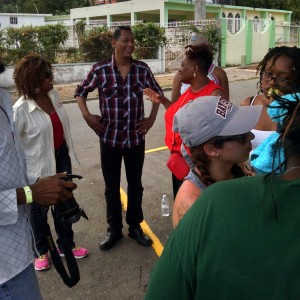Bay State College Service Learning in Jamaica: Part 3

Our Service Learning group reflects on the tough conditions in Jamaica and their experiences visiting some of the children's facilities in Kingston.
Saturday, May 23rd
Katrina C.
The last few days have been a bit of a roller coaster and our fifth day was extremely hard for me. We have had speakers from several different children facilities; Inspector Elaire Jeffrey Henderson from CISOCA (Center for Investigation of Sexual Offenses and Child Abuse), Mable Morris, Director of Children Services and Corrections, Attorney Dahlia Harrison from the Offices of the Children Advocates and lastly Gloria Walters from A Child Guidance Clinic. All these woman represent a group of individuals who become forgotten by society, lost in the correctional system, extremely delicate and not wanted by their parents. I felt that I should have waited to write this blog about my experience until the field trips to some of the locations where these children, adolescents and young adults were being sheltered were finished. We as Americans are very lucky in multiple ways. Our ghettos do not reach intensity of poverty as the ghettos of Kingston. It had me wondering, why do we as citizens of the world allow for another human-being to live in such circumstances that these children are forced to live in?
Tyler O.
Day five was the most physically challenging we have had. Severe heat and three back to back visits to children's facilities took a toll on us. We did recover and took in a play at the campus in the evening. The first facility we went to was a house of safety for young girls that are involved with the court in some way. This could include wayward and disobedient or street children who are abandoned. The girls were very inviting and we had a great time. They tried to teach me how to hula hoop but my hips don't move like they used to. The second facility we went to was the hardest for us and really showed the challenges Jamaica faces. The facility houses young children who are in state care and this included 32 infants and children with severe mental and/or physical handicaps. It was difficult to see so many children without homes. The facility struggles with resources and are doing the best that they can but certainly not close to U.S. standards. Our final visit was to a youth correctional facility and they had some very progressive learning programs including aquatic gardens and a music room which was donated by USAID. The living conditions for these boys, however, were deplorable. Our guide said "this is as real as it gets" when we were in the living quarters and her point was that the boys here get a taste of what prison life is like. The boys are locked up in eight bed cells with inclusive toilet and shower for about 15 hours a day. Pretty bad conditions.
Monday, May 26th
Dr. William Morrissette
A long day and I am exhausted. I thought about going to bed but my bed has bugs crawling all over it so figured I would blog while I establish a plan. I must be officially assimilated because the prospect of sleeping with bugs is not bothering me that much. We seem to be dirty all the time. They don't give you knives at all and we eat nothing but chicken with barbecue sauce so our hands are constantly sticky and there is no soap in public bathrooms so not much hope of improving your hygiene there. So, you just say "no worries mon" and move on. We did our service learning project this morning and it was tiring but enjoyable. With worked with other groups to improve the elementary school. We got a visit from the Minister of the area who is equivalent to our congressman. He thanked us which was pretty nice. We repainted all the striped lines in the parking lot and created a no parking zone outside the front of the school. We ended the day by attending a concert in the park. This day is African Liberation Day as well as Labor Day in Jamaica and the concert was put together to celebrate both. There were dignitaries from Nigeria and Ethopia as well as local political figures. Additionally, the event was moderated by one of the most famous poets in Jamaica, Mutabaruka, and there were several very well known Reggae artists. It was a good time. A lot of the music advocated for action against social injustice which confirmed what we had expected which was that there is still a strong resentment left over from the colonization period. Tomorrow we are back to the classroom.